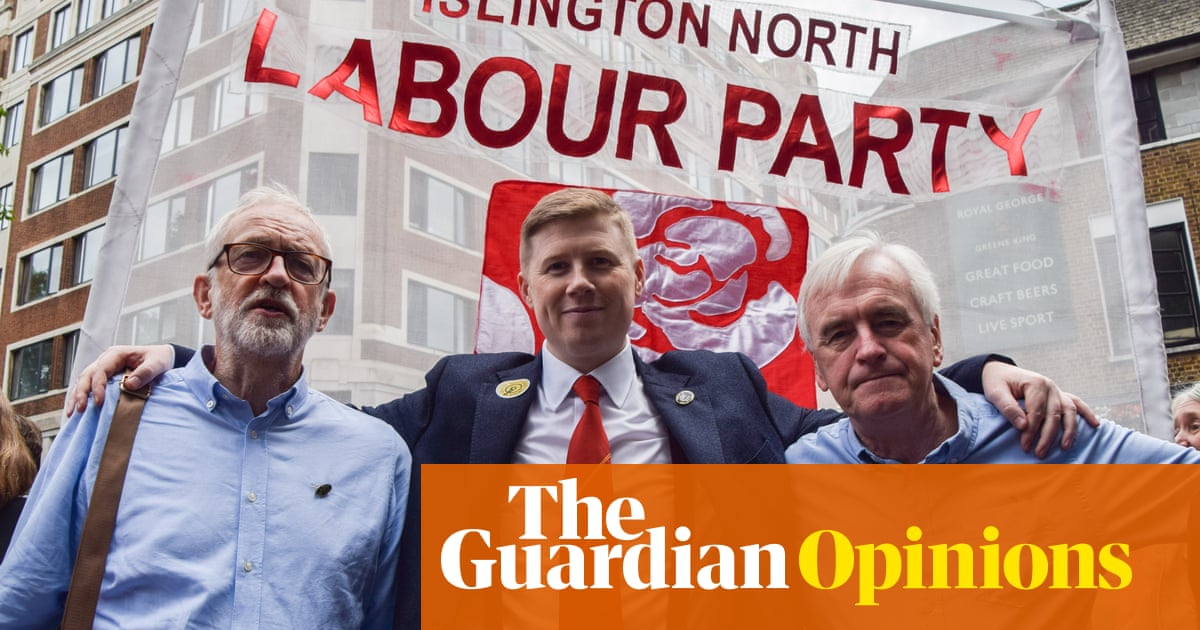
Iwrote a book in 2014 that had the shortest window of relevance not just of anything I’ve written, but of anything I’ve ever read. It was conceived at a time when it felt like were living under a Forever Coalition – that we would always have a government like this, and always talk about it as a compromise administration, a well-meaning patch-up job, when the reality was the opposite of that: radical, destructive, callous to a degree that many of us had never witnessed as adults.
What also looked eternal at that point in time was a Labour party one minute scared of its own shadow, the next imitating the coalition’s worst impulses, as if every fresh act of government xenophobia were a sign that the voters were crying out for more xenophobia. Ed Miliband’s “controls on immigration” mug hit everyone quite hard, no offence.
What change could one possibly achieve outside the walls of parliamentary politics? As a citizen, how could you work around Westminsterand keep your spirits up when traditional politics held no interest for or discernible possibility of change? Was it better to organise a climate strike or run the modelling on a universal basic income? Could you use your power as a renter, as a shareholder, as a pension-saver, or was that just an updated consumer boycott?
Never mind the answers: the book came out in April 2015, and less than a month later, there was an outright Conservative victory. Four months after that, Jeremy Corbyn was elected Labour leader. Westminster suddenly looked very central again, Labour technocrats replaced by idealists, coalition pragmatists and belt-tightening Conservatives replaced over time by swivel-eyed lunatics – the same politicians, often, play-acting.
Workaround politics weren’t at all important when politics-politics were moving so fast that they hurled themselves off a cliff, but let’s not relitigate that. We are now circling the same question that has largely dominated and certainly blighted the past 10 years: if you disagree with the Conservative government; if you find its worldview toxic and its agenda void of anything nobler than self-enrichment; if you take the climate crisis seriously and can’t stomach other people living in abject poverty as the mysterious but God-given price of being modern; if you look at Labour and see a party contorting itself into rightwing frames, then pleading with voters to give it a chance, because underneath it’s just a bit nicer, where do you put your energy at that point?
People who don’t have Labour at the centre of their vision for change are a lot less despairing. I’d divide them, broadly, into five categories: those who are rooting for an alternative party, which means the Greens (Lib Dems, in my admittedly scant experience, are as depressed as Labour members); those who have been very close to Westminster politics in their lives, but have become disillusioned, and worked through it to create other modes of engagement; those who never had any faith in traditional party politics to begin with, though may have reevaluated that under Corbyn (they are mainly young, and could be loosely described as “despair-natives”); those involved with an institution that has its own political power that doesn’t dovetail with Labour’s, though in theory it could (spirit animal: Sharon Graham, head of Unite); and those with an overriding single issue for which they’ll ally strategically but temporarily with other movements. There’s a lot of crossover between these groups, and many people will occupy more than one; I can think of a handful who would say they belong in all five.
The single overwhelming message I’ve heard, whether from a GMB youth branch or a Compass meeting, an Extinction Rebellion founder or a bedroom tax activist, is that not all meaningful change could come from Westminster even if it were able to generate it. Focus grouping is the opposite of politics, which should be about persuasion. But persuasion is not Lloyd George standing in Limehouse. It has to happen at the grassroots.
If the division between the deserving and undeserving poor is the perennial swindle of rightwing commentary, the division between the good grassroots, who everyone wants to “engage”, and the crank grassroots, who must be smashed to woo back the regular voter, is subtler, more recent and just as bogus. In the “good” category are community centres; neighbours, chatting; faith groups; Keir Starmer’s neighbourhood WhatsApp wheeze. In the “crank” category are union branches; direct-action groups working on climate or rent strikes; the bedroom tax activists of the mid-10s, building networks of support and solidarity; student protesters; lately, LGBTQ activists, who are still allowed to be colourful and benign, so long as they accept that if they want yet more equality, they’re the bigots, actually.
Most dangerous to the current, dispiriting compact between left and right in central government are a revivified union movement, working simultaneously to combat exploitation person by person and to redefine what exploitation means, whether by challenging poverty pay or ending zero-hour contracts; a symphonic climate movement, where those crowdfunding windfarms aren’t hating on those blocking Westminster Bridge; a social movement where racial equality and humane immigration are foundational not peripheral, where food banks are as political as reclaim the streets marches, where people can take their place on the spectrum between action and direct action, knowing that if their agenda is to be inclusive, it will always be in flux.
Communities have goodwill and activists have demands. This has been recast, by politicians from both the main parties, by pollsters and commentators, by BBC interviewers ventriloquising “authenticity”, as a badge of shame; if there’s anything you want from politics, whether it’s the decent treatment of refugees or to reach net zero before it’s too late, this puts you beyond the pale for regular folk. That’s an incredibly convenient truism for power, since without a demand, there is nothing to concede. But it doesn’t have to be anyone else’s truism, since it isn’t even true.
Zoe Williams is a Guardian columnist












